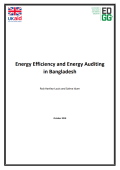
Bangladesh is at a critical stage in its development, being now listed as a middle-income country, and looking to reach upper-middle income status by 2021. Key to this change is the expanded growth of GDP from its stable 5-6% current growth, to a 7.5 – 8% level which is seen as being integral to the country’s continued progress. To reach the next level, Bangladesh will need to overcome a number of constraints to continue on its export-led growth path.
These are,
- insufficient supply of reliable energy,
- policies that indirectly stunt the development of economic activities unrelated to readymade garment exports, and
- insufficient security about property and land rights due in part to inadequate registry systems .
It is the first of these points that this paper is most interested in. The lack of a reliable electricity supply in Bangladesh has blighted economic development, and the impending shortage of natural gas compounds the difficulties in resolving this issue.
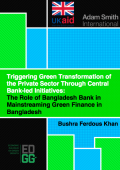
This paper Triggering Green Transformation of the Private Sector Through Central Bank-led Initiatives: The role of Bangladesh Bank in mainstreaming green finance in Bangladesh presents a diagnostic assessment of the initiatives undertaken by Bangladesh's central bank to disburse green finance to the private sector. It also proposes a functional conceptualization of the term "green finance" for the national context and spells out a number of recommendations for triggering a green transformation of the private sector through central bank-led initiatives in Bangladesh.
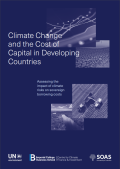
This report, Climate Change and the Cost of Capital in Developing Countries, represents the first systematic effort to assess the relationship between climate vulnerability, sovereign credit profiles, and the cost of capital in developing countries.
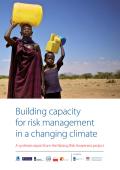
The Raising Risk Awareness (RRA) project uses the latest advances in climate science to understand the role of climate change in the occurrence of extreme weather events in developing countries. The project also considers how such information is communicated between those who undertake the analyses (scientists), those who disseminate the information (media and communicators) and those who ultimately incorporate this information in decision-making (policy-makers). This report provides a summary of the project’s results and learning.
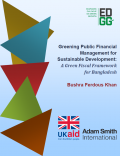
This paper Greening Public Financial Management for Sustainable Development: A Green Fiscal Framework for Bangladesh offers suggestions on how principles of environmental conservation and sustainable use of natural capital can be embedded in, and delivered through the public financial management (PFM) system of Bangladesh.
